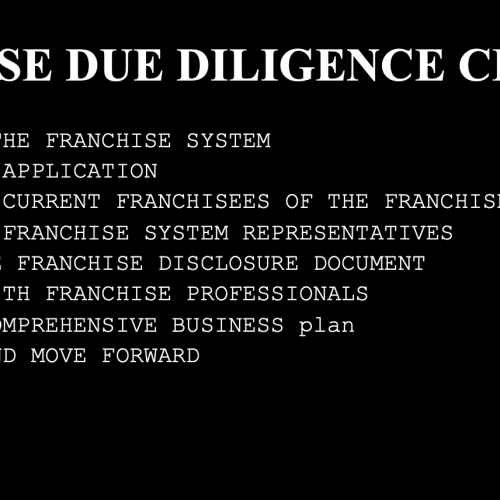Investing in a new business is a serious proposition. It deserves due weight and consideration. We can’t make it easy, but we can help make it simple with the 10 Steps To Starting A Franchise guide.


What type of franchise do you want?
Its not yet time to look at specific industries or specific brands yet. For now, concentrate on the fundamentals that are important to you;to do you want B2B or B2C business? Would you like to employee a large staff, or have a smaller operation? Are you interested in the concrete feel of a brick and mortar business or the flexibility of a home-based operation? Can you commit full-time efforts, or do you need to look at something that is passive/semi-passive?
Are you going to engage help in the investigation process?
Franchise brokers and coaches can be an invaluable resource to many people. They help you perform object evaluations of your interests, life goals, and investment and ROI requirements. However some individuals prefer to handle the entire research process themselves, or even engage multiple specialists for developing funding plans, strategic plans, and a business plan.


Begin your initial research
There are many ways to narrow down your search. Working with a coach is one. We have an answer on Quroa that talks about another approach
Engage with franchisors
Once you have narrowed the field, engage with brands you are interested in.
Get an understanding of:
- A day in the life of a franchisee
- What the expectations of the franchisor are
- What you can reasonably expect from the franchisor
- What their evaluation process and qualifications are


Begin your due diligence process
Your diligence process is where you narrow the field of prospective franchisors. It should include:
- Reviewing the Franchise Disclosure Document
- Industry and competitive analysis
- If appropriate, visiting a local franchised location


Meet the franchisor
Attend a discovery or confirmation day. Pay attention to the small details that can reveal many things about the franchise operations. Make sure you meet the key members of the team that you’ll be working with for the next 5-15 years (or longer!). This should be a mutual interview, and no questions should be left on the table by the end of this day. You should walk away from confirmation day knowing if this is the right fit.

